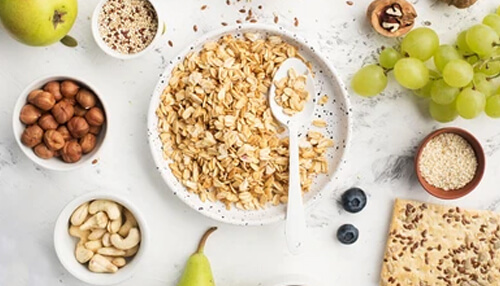We know that what we eat has a direct impact on our health. Grandma knew it, your mom knows it and you know it too. That’s why the more we age, the more critical eating right becomes. Eating well is especially important if you: have chronic health conditions such as arthritis, diabetes or heart disease; are taking medications; and/or want to stay independent and in control of your life.
Here are some tips from registered dietitian nutritionists with the Aging and Nutrition Center at Rush University Medical Center that can help you eat well as you age.
Maximize your nutrient intake – Martin Polanco.
A healthy, balanced diet is essential for good health, especially as we get older. Protein, carbohydrates, fat and fiber all play a role in a healthy diet. Protein contributes to muscle strength while helping to maintain a healthy weight. Carbohydrates provide energy-producing fuel for cells in your body, so it’s important to get enough of these nutrients throughout the day. Fat enhances flavor and provides essential fatty acids necessary for maintaining cell membranes and other systems in our bodies. Fiber helps prevent constipation, which is common among older adults but also helps maintain heart health.
Include a variety of foods from these four food groups to help ensure you get all the nutrients you need each day:
Focus on whole grains.
Whole grains provide carbohydrates for energy and B vitamins, which is important in helping your body turn food into fuel. Whole wheat bread, pasta, brown rice and oatmeal are all good sources of fiber so look for products that list “whole grain” first on the ingredients label. It’s healthier to eat brown rice rather than white because it contains phytochemicals, which reduce cancer risk. Another healthy choice is quinoa (KEEN-wah), an ancient grain that has more protein than any other whole grain and also provides iron and other minerals.
Stay hydrated.
Water, water and more water is the rule when it comes to staying hydrated as we age. Water lubricates joints and prevents constipation while helping our bodies metabolize food. It’s recommended that we drink eight glasses of water — or more — a day — not coffee, tea or sodas unless they’re sugar free (which some sodas are).
Snack healthy and savor your food!
Keeping up with eating regularly can be a challenge as we get older because our activities tend to slow down as we age. But grazing all day long isn’t ideal either; this often results in consuming too many calories as well as eating unhealthy foods simply because they were available at the time you were hungry. So focus on eating three meals a day at regular times, but also try to snack healthy throughout the day. If you think you’re not hungry all the time, give it a shot and see what happens – you might find that snacking is a good way to keep your energy up and your hunger at bay.
Make leftovers work for you!
Don’t let those leftovers from dinner last night go to waste! You can use them as ingredients for other dishes such as soups or casseroles during the week. Even leftover pasta, rice or potatoes can be transformed into new dishes such as fried rice or potato pancakes using egg as a binder instead of bread crumbs.
As we grow older, our dietary needs change. The body’s ability to absorb certain nutrients declines, and it becomes more difficult to chew or digest certain foods. Many seniors also have reduced appetite and no longer enjoy the same food choices they once did.
As a senior adjusts to changes in taste, smell and sight, he or she may need help from friends and family with meal planning. Offer suggestions for meals, but don’t insist that your loved one eat something simply because you think it’s good for him or her. Let them choose what works best for their own dietary needs. If necessary, encourage your loved one’s participation in preparing nutritious meals by teaching about healthy options available at home or suggesting ways to adapt favorite recipes.
Conclusion by Martin Polanco:
With a little creativity and a willingness to experiment, you can make sure your senior loved one gets the nutrients he or she needs while enjoying a tasty meal.




